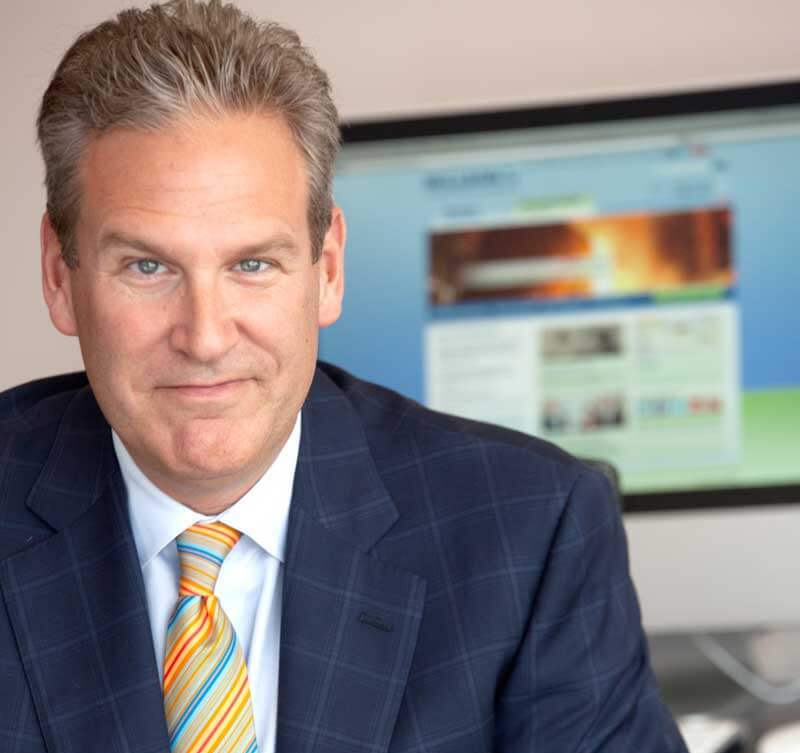Interview with Peter Willson, CEO of Willson International, Canada
In 1918, William F. Willson gave up his job as a Collector of Customs at the port of Fort Erie in Ontario, Canada to open his own customs brokerage office at the Fort Erie ferry landing. Wm. F. Willson Brokerage Ltd., as the company was then known, was the first Canadian customs broker at the new Peace Bridge. Over a hundred years later, Willson International is now a leading customs brokerage and logistics service provider to importers in Canada and the United States.
Tharawat spoke to the current CEO of Willson International, William F. Willson’s great grandson, Peter Willson, about the history of his family business, how to weather different economic cycles, and the factors that lead to success.
Tell us a bit about your family business history.
By the end of World War I, customs duties and excise taxes were the main source of government revenue in Canada. Since the automobile industry was in its infancy, commercial quantities of imports arrived by either rail or ship. There were no vehicular bridges across the rivers connecting the Great Lakes. Rail bridges also did not exist, so there was an active ferry and barge industry. Ferries crossed the Niagara River between Fort Erie, Ontario, and Buffalo, New York, and a railway bridge crossed the river about 5 kilometres upstream, between Buffalo and Bridgeburg, now the north end of Fort Erie.
In 1869, my great-grandfather joined the Canadian Customs Service, becoming the Collector of Customs for the port of Fort Erie. He saw that trade between the Eastern United States and the industrial heartland of Ontario was about to experience tremendous growth. He resigned from Customs Service in 1918, when he was 53 years old, and opened a customs brokerage office at the Fort Erie ferry landing. Shortly afterwards, he opened a branch office in Bridgeburg to handle rail freight. He also opened an insurance agency and real estate brokerage, which remained operational for many years, though they were eventually sold in the 1950s.
My grandfather was very involved in business life in the Niagara Frontier, and was a key figure in the development of the Peace Bridge. He assembled the land for the Canadian side of the bridge, was Secretary of Construction when the Peace Bridge was inaugurated in 1927, and remained Director of the Buffalo and Fort Erie Bridge Authority for many years. Wm. F. Willson Brokerage Ltd., as the company was then known, was the first Canadian customs broker at the new Peace Bridge.
Picture: (right to left) William F. Willson and William A. Eckert, vice president of the Bridge company, at the ground breaking of the Peace Bridge in Fort Erie.
What was your great grandfather’s initial vision for the business?
My great-grandfather built his business on his reputation. At the time, customs brokers represented their clients in all matters with Canada Customs. Without a broker, importers had to represent themselves at the border. Before the advent of automation, this was largely dependent on individual experts. Brokers therefore required detailed knowledge of a huge body of regulations. In a matter of years, his list of clients contained household names like Stelco, Dofasco, Massey Harris, International Harvester, Firestone, Goodyear, and many others. His vision of providing an excellent business service to a growing market of international trade continues to this day.
When did you join the family business and why?
I officially joined WillsonInternational in 1997. I am part of the 4th generation of Willson family management. By the time my father became active in the business, I was the only one without a career path. As my father started to expand, he decided to pass Willson on to the next generation and asked me if I was interested. I started working summer breaks to gain an understanding and appreciation of the company.
I anticipated joining the business when I finished my undergraduate studies, but a degree in Metallurgical Engineering from Queen’s University in Kingston, Ontario, wasn’t deemed helpful. At my father’s suggestion, I obtained my MBA with an emphasis in Accounting, from the University of Toronto. I joined Ernst & Young (E&Y) Toronto and worked in assurance practice for the firm’s large publicly traded mining companies. After achieving my chartered accountants designation, I left E&Y and joined Willson.
Are any other family members working with you at the moment?
Of my immediate family, I am the only one working in the business. My brother and two sisters, all older than me, had chosen career paths by the time my father started thinking of succession. My cousin, Jeffery Willson, works as part of our Compliance and Customer Service team. My father, Bill Willson, retired in the summer of 2014.
Your family has demonstrated incredible business acumen over many generations. To what do you attribute this continued success? Is it “nature” or “nurture”?
Willson has thrived as a family business for almost 100 years. Both my father and I gained valuable business experience and a sense of confidence by working outside of Willson. Because of these experiences, we have a thirst for knowledge, aren’t afraid of trying new things, can embrace change, and are willing to look to uncommon places for new ideas. As a private family business, we can take the long view on opportunities, and aren’t subject to the whims and demands of the public marketplace. I think that a unique aspect of family business is that it takes both “nature” and “nurture” to work. You can’t escape your upbringing or your own experiences when working with family.
Your family business has witnessed multiple economic cycles over its long existence. Do you see patterns repeating themselves? How is the current economic age different from those before?
Willson has survived the great depression and every economic cycle since. The simple fact is that the world will continue through the ebb and flow of economic expansion and retraction. Given the rise of technology and international trade, global connectedness certainly makes these systems more complex and far reaching. Global events now have the ability to impact trade cycles as never before. Businesses now need to be agile to manage quick change.
Who or what is your greatest inspiration?
I’d be surprised if inspiration didn’t come from within the family business. I’ve learnt what, I believe, are our three key factors of success from my father, and have even embedded them in our corporate values.
The first factor of success is “don’t believe your own press”. Not only do we have to convince people that we are the best in our field, but we must also show them that we can meet their service needs. To achieve this, to exceed their expectations, we have to always strive to do and be better. As soon as we believe we are as good as we tell our clients, we no longer are. In our values, this is “Continuous Improvement”.
[ms-protect-content id=”4069, 4129″]
The second factor is the ability to manage risks without being afraid to grow and invest in the business. My father had a successful career in publishing and oil outside of Willson, which allowed him to retire in his mid-forties. Professional managers ran Willson while he built his outside career. He eventually returned to the family business in 1987 with a focus on growth. Until then, Willson had primarily grown through word of mouth. There wasn’t a sales force or a marketing department. My father promptly created a sales team and began aggressively building the business and expanding services. In 1987, he opened the company’s US operations and in 1997, a logistics division focusing on international air and ocean forwarding and trans-border trucking. My father took risks to ensure business growth, embrace technological innovation, and focus on the customer. In our values, this is “Courage”.
The third factor comes from being able to spend time with my father growing up. During my father’s first retirement, I had the benefit of being in my mid-teens, which allowed me to finally spend some time with him. He taught me to skeet shoot. We would compete together at events across North America. He also taught me to hunt for upland game and fly-fish. We continue to do these things together. I look at our business as a marathon, not a sprint. We have to focus on our customers’ needs in addition to those of our team’s. We have to be respectful of their family needs as well. I enjoy being able to do these things with my father, which has carried over to enjoying activities with my wife and daughters. We need to balance work and family because they need each other. This is our “Family First” value.
How has your family business adapted to the digital age?
Access to technology is one of Willson’s key value propositions. The customs brokerage industry in North America has, in some way, been automated for decades, as a requirement of communication between Canadian and American customs. With the development of the sales team in the late 80s, we embraced Customer Relationship Management tools in order to keep up with our customers and manage sales activity. In the early 90s, we developed our own operating software to manage our growing operations due to a lack of products on the market capable of handling our diverse client needs. Those systems were completely upgraded in 1999, and again in 2014. We expanded our service offerings in 2012, allowing for complete document imaged solutions and electronic invoicing. Today, the company offers a suite of technological tools called WillTrade that allows customers to electronically interact with us. We spend time seeing how customers use new technologies, and then innovate tools that are more productive and in line with clients’ needs.
Your export and import activities must witness considerable volatility. How do you mitigate risks in a rapidly changing world?
Markets expand and contract along with the economy. A quick decline in economic activity can have a widespread effect on our clients and their international trade volumes. We manage the risk of that volatility by being close to our customers through our service and sales teams. We hear first hand what is happening and how it impacts their businesses. With the firm’s technology, we can quickly respond to staffing shortages and overages, and can move processing volume to wherever capacity is greatest. Because we are a private business, we can be nimble in our decision-making and take advantage of the opportunities in front of us. We make sure we are not financially dependent on any one or handful of clients. Currently, Willson doesn’t have any one client worth more than 10% of revenue or 3% of receivables.
There is a lot of discussion as to what constitutes s successful family business growth strategy. How can leaders optimally align family and business when their ambition is to grow at a steady pace?
I think you have to set expectations for family and expectations for business, and make sure they align. Many times, the primary means of family wealth is tied into the business. This can create a challenge when balancing family financial needs and corporate growth. At the same time, the alignment of family and business wealth can be a family business’ greatest strength.
If you could give the next generation of family businesses a piece of advice, what would it be?
I have been an active member of Young President’s Organization (YPO) for over 10 years, and have had the opportunity to speak with many family business owners of various sizes. Many of the discussions end up being about succession. Today’s youth are encouraged to follow their passions, which might not necessarily align with family obligation. I would tell the next generation not to shy away from the joy, professional growth, and satisfaction that can be found in a family business. Quite the contrary, family business can be the greatest passion of all.
Tharawat Magazine, Issue 27, 2015
[/ms-protect-content]

